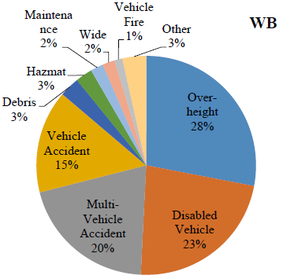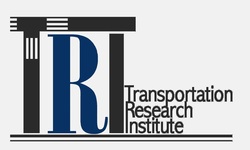Investigation of Sources of Congestion at the Hampton Roads Bridge Tunnel

Sponsor: Virginia Department of Transportation (VDOT)
PI: Mecit Cetin, Ph.D.
Description: The Hampton Roads Bridge Tunnel (HRBT) serves as a critical link for regional mobility and economic activity in Hampton Roads, but it is also a source of significant recurring and non-recurring congestion. This study is focused on investigating the sources of non-recurring congestion and on identifying potential bottlenecks along the HRBT corridor and their capacities. In order to assess the magnitude of non-recurring congestion, all incidents recorded in 2013 are analyzed and correlated with the observed travel speeds from INRIX probe data. For each incident record within the database, the delay attributed to that particular incident is estimated based on the INRIX travel times and new prediction algorithms. It is found that the HRBT corridor experiences a significant level of congestion and delays, costing the traveling public approximately 1.13M vehicle-hours or $33.2M annually (estimate based on 2013 data). Of the total delay, 72% is due to high volume while the rest (28%) is incident-induced. If the incident-induced delays are broken down by cause, over-height trucks contribute the most. Stopping the traffic to process over-height trucks costs $2.58M whereas all crashes in 2013 cost $2.56M. Disabled vehicles also contribute significantly to the incident-induced delays with $2.2M.
PI: Mecit Cetin, Ph.D.
Description: The Hampton Roads Bridge Tunnel (HRBT) serves as a critical link for regional mobility and economic activity in Hampton Roads, but it is also a source of significant recurring and non-recurring congestion. This study is focused on investigating the sources of non-recurring congestion and on identifying potential bottlenecks along the HRBT corridor and their capacities. In order to assess the magnitude of non-recurring congestion, all incidents recorded in 2013 are analyzed and correlated with the observed travel speeds from INRIX probe data. For each incident record within the database, the delay attributed to that particular incident is estimated based on the INRIX travel times and new prediction algorithms. It is found that the HRBT corridor experiences a significant level of congestion and delays, costing the traveling public approximately 1.13M vehicle-hours or $33.2M annually (estimate based on 2013 data). Of the total delay, 72% is due to high volume while the rest (28%) is incident-induced. If the incident-induced delays are broken down by cause, over-height trucks contribute the most. Stopping the traffic to process over-height trucks costs $2.58M whereas all crashes in 2013 cost $2.56M. Disabled vehicles also contribute significantly to the incident-induced delays with $2.2M.




